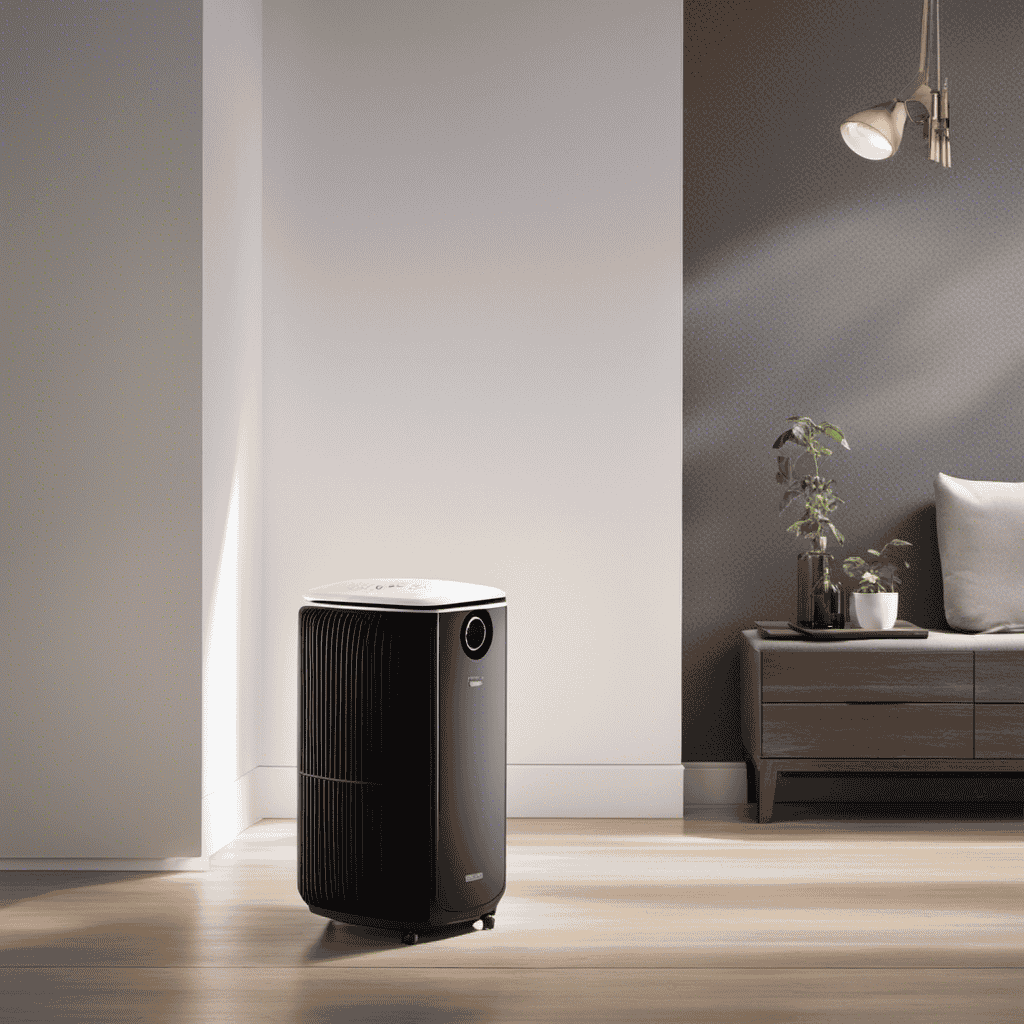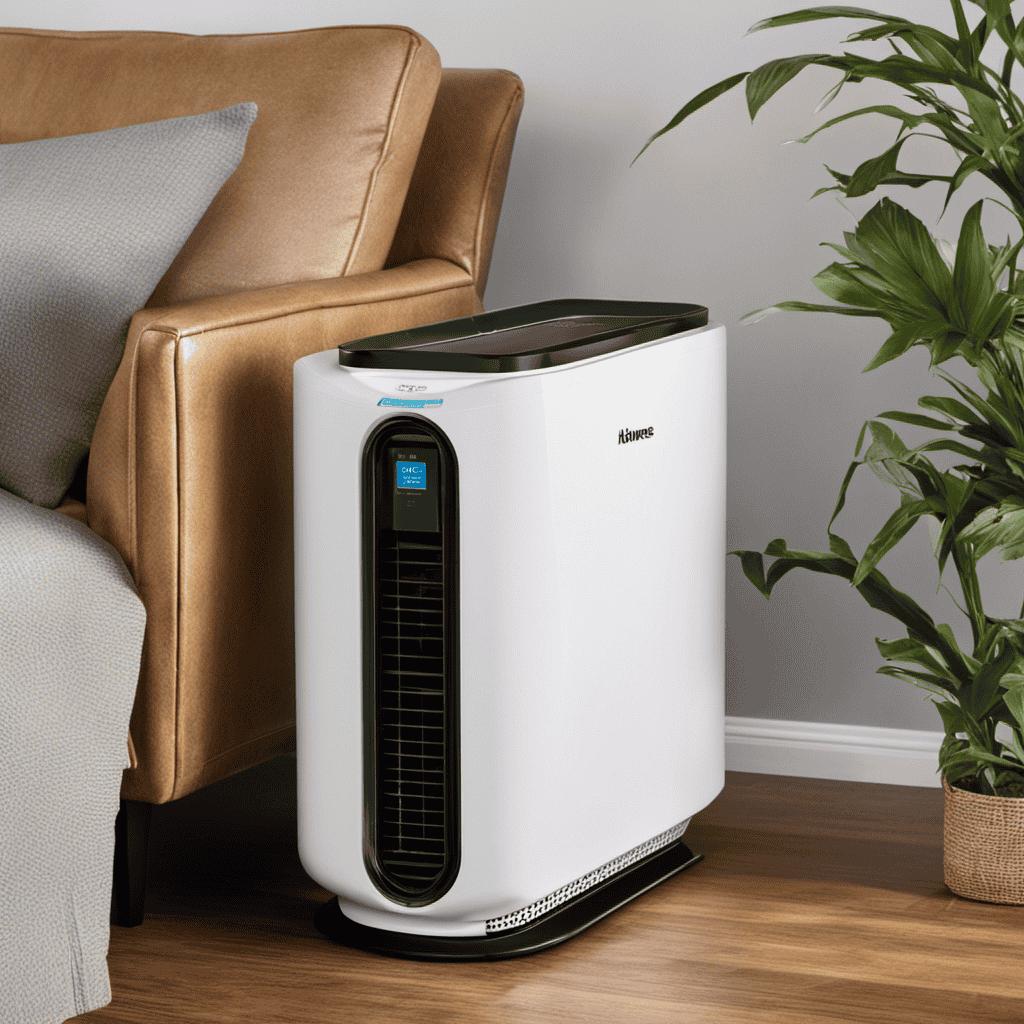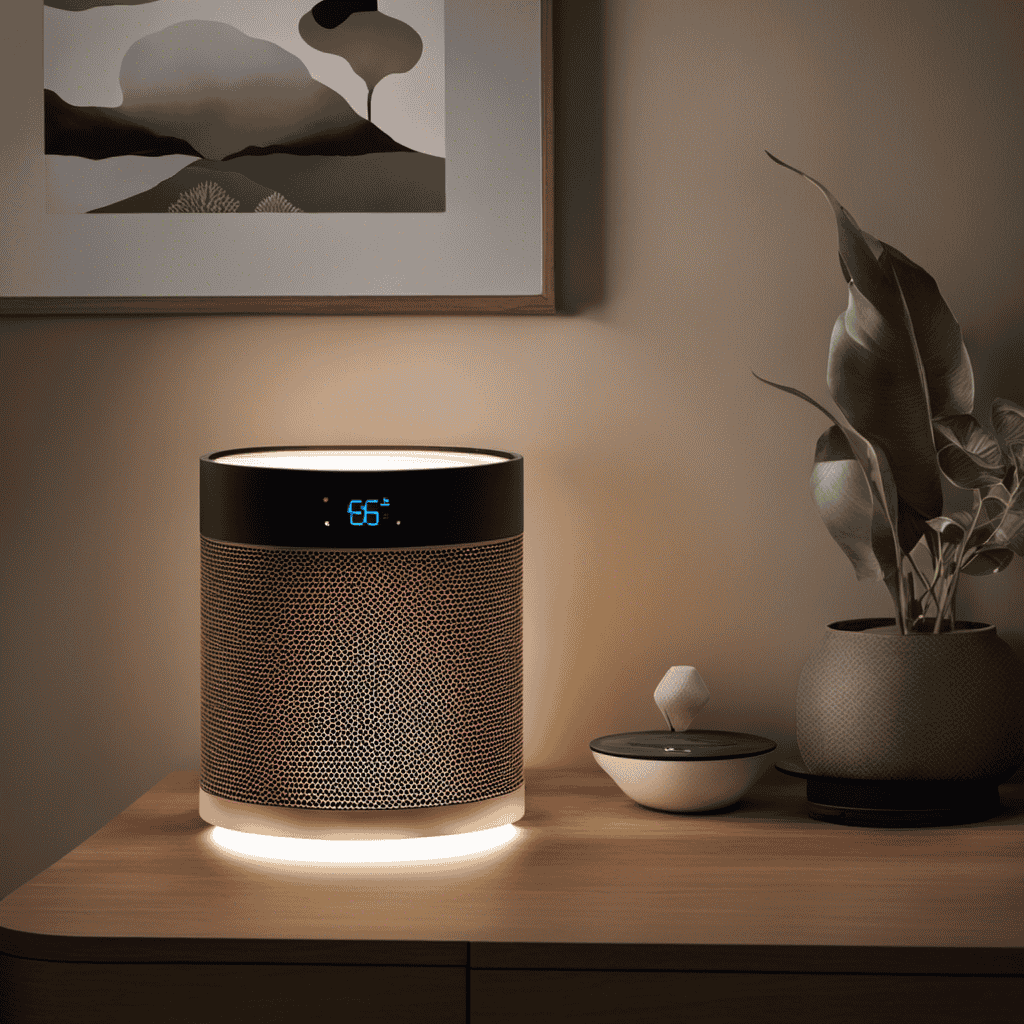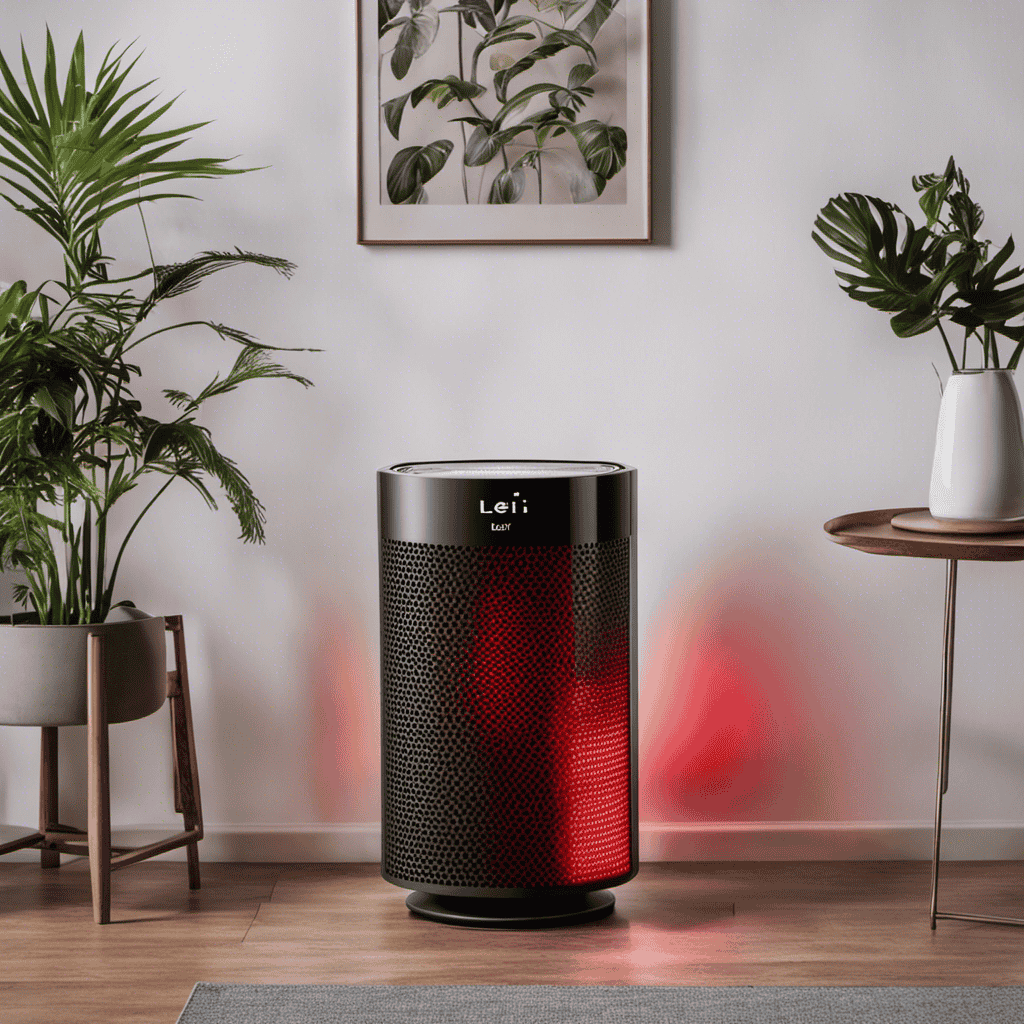In my constant quest to enhance the air quality in my home, I frequently consider the dilemma: ‘Should I choose a dehumidifier or an air purifier?’
In this article, we will dive deep into the world of indoor air quality, exploring the role of dehumidifiers and the benefits of air purifiers.
By analyzing the efficiency of these devices and their impact on indoor air quality, we will help you make an informed decision on whether to invest in a dehumidifier or an air purifier for your home.
Key Takeaways
- Dehumidifiers reduce excess moisture in the home and prevent the growth of mold and mildew.
- Air purifiers remove impurities and pollutants from the air, improving overall indoor air quality and promoting better respiratory health.
- The choice between a dehumidifier and an air purifier depends on specific needs and conditions of the home, such as humidity levels and allergies.
- Dehumidifiers consume more energy than air purifiers, but air purifiers generally have a lower initial cost and can result in long-term savings.
Understanding the Role of Dehumidifiers
If you live in a humid climate, you’ll find that a dehumidifier can help to reduce excess moisture in your home. Humidity control is essential for maintaining a comfortable and healthy living environment.
Excessive moisture in the air can lead to various problems such as mold growth, musty odors, and damage to furniture and electronics. A dehumidifier works by drawing in the humid air, extracting the moisture, and releasing dry air back into the room.
It helps to maintain an optimal humidity level, typically between 30% and 50%, which is ideal for preventing the growth of mold and mildew. By removing excess moisture, a dehumidifier not only improves air quality but also helps to protect your home and belongings from the damaging effects of high humidity.
Exploring the Benefits of Air Purifiers
Exploring the benefits of air purifiers reveals various advantages for improving indoor air quality. Air purification systems are designed to remove impurities and pollutants from the air, creating a cleaner and healthier environment.
These devices can effectively remove allergens such as pollen, dust mites, and pet dander, reducing the risk of allergic reactions. Air purifiers also eliminate harmful particles like bacteria, viruses, and mold spores, helping to prevent respiratory illnesses.
Additionally, some air purifiers come with features such as activated carbon filters or UV-C light technology, which can further enhance the purification process by eliminating odors and killing germs.
With their ability to remove harmful substances from the air, air purifiers play a crucial role in improving overall indoor air quality and promoting better respiratory health.
Factors to Consider When Choosing Between a Dehumidifier and Air Purifier
When considering the choice between a dehumidifier and an air purifier, it’s important to take into account factors such as humidity level and allergies.
High humidity levels can promote the growth of mold and dust mites, which can trigger allergic reactions in sensitive individuals.
On the other hand, specific air quality needs, such as removing pollutants or odors, should also be considered when deciding between the two options.
Analyzing these factors thoroughly will help in making an informed decision that best suits one’s individual needs.
Humidity Level and Allergies
Maintaining a lower humidity level can help alleviate allergies, making a dehumidifier or air purifier beneficial.
Humidity control plays a significant role in reducing allergy symptoms. High humidity creates a breeding ground for dust mites, mold, and other allergens that can trigger allergic reactions. By using a dehumidifier, you can reduce the moisture in the air, making it less conducive for these allergens to thrive. Additionally, a dehumidifier can help prevent the growth of mold, which is a common allergen.
On the other hand, an air purifier can help remove airborne allergens such as pollen, pet dander, and dust mites from the air. It uses filters or other technologies to capture and trap these allergens, improving indoor air quality and reducing allergy symptoms.
Both a dehumidifier and air purifier can be effective in providing allergy relief, but the choice depends on the specific needs and conditions of your home.
Specific Air Quality Needs
To meet your specific air quality needs, I highly recommend evaluating the different options available.
When it comes to improving air quality, two popular choices are dehumidifiers and air purifiers. Understanding the specific needs of your environment is crucial in determining which option will be most effective.
For instance, if your main concern is reducing excess moisture and preventing mold growth, a dehumidifier would be the ideal choice. On the other hand, if you are more focused on removing allergens, dust, and other particles from the air, an air purifier would be more suitable.
To make an informed decision, it is important to compare the performance of both devices and consider factors such as coverage area, filtration system, noise level, and energy efficiency.
Comparing the Efficiency of Dehumidifiers and Air Purifiers
When choosing between a dehumidifier and an air purifier, it’s important to consider the health benefits provided by each option.
A health benefits comparison can help determine which device is more effective in improving indoor air quality and reducing respiratory issues.
Additionally, an energy consumption analysis and cost-effectiveness assessment can provide insights into the long-term efficiency and affordability of both options, helping homeowners make an informed decision.
Health Benefits Comparison
Using a dehumidifier or an air purifier can both provide health benefits.
When it comes to maintaining a healthy indoor environment, managing the humidity level is crucial for respiratory health. High humidity levels can promote the growth of mold, dust mites, and other allergens, which can trigger respiratory issues such as asthma and allergies. A dehumidifier helps to reduce excess moisture, inhibiting the growth of these allergens and creating a more comfortable living space.
On the other hand, an air purifier plays a vital role in removing airborne particles such as dust, pollen, pet dander, and smoke, which can also worsen respiratory conditions like asthma. By filtering out these pollutants, an air purifier can significantly improve indoor air quality and help manage asthma symptoms.
Energy Consumption Analysis
You can save on energy consumption by considering the wattage of the device you choose.
When it comes to comparing the energy consumption of dehumidifiers and air purifiers, it’s important to conduct an in-depth analysis. An environmental impact assessment can provide valuable insights into the energy efficiency of these devices.
Dehumidifiers typically consume more energy than air purifiers due to their complex mechanisms. They require the use of compressors and fans to remove excess moisture from the air. On the other hand, air purifiers mainly rely on fans and filters to clean the air.
By choosing an air purifier with a lower wattage, you can significantly reduce your energy consumption and minimize your environmental impact.
It’s crucial to consider energy efficiency when making a decision between a dehumidifier and an air purifier.
Cost-Effectiveness Assessment
By considering the cost-effectiveness of both devices, it’s clear that dehumidifiers tend to be more expensive to operate compared to air purifiers. When assessing the cost effectiveness, not only the initial purchase price but also the long-term savings should be taken into account.
Dehumidifiers typically consume more energy and require regular maintenance, which adds to their operating costs. On the other hand, air purifiers are generally more energy-efficient and require less maintenance, resulting in lower operational expenses.
While dehumidifiers may be beneficial in specific situations where excessive moisture is a concern, for most households, air purifiers offer a more cost-effective solution. These long-term savings can be significant, making air purifiers a more economical choice in the long run.
Now, let’s delve into the impact of dehumidifiers and air purifiers on indoor air quality.
The Impact of Dehumidifiers and Air Purifiers on Indoor Air Quality
When it comes to improving your indoor air quality, both dehumidifiers and air purifiers can have a significant impact.
Humidity control is essential in maintaining a healthy living environment, as high humidity levels can lead to mold growth and other respiratory issues. Dehumidifiers work by reducing the moisture in the air, effectively combating excess humidity.
On the other hand, air purifiers focus on removing pollutants and contaminants from the air through various air purification techniques such as filtration, ionization, and UV-C light. These methods can eliminate allergens, dust, pet dander, and even odors.
By using both dehumidifiers and air purifiers, you can effectively control the humidity levels and ensure that the air you breathe is clean and fresh.
Now, let’s explore how to make the right decision: dehumidifier or air purifier?
Making the Right Decision: Dehumidifier or Air Purifier?
Now that we understand the impact of dehumidifiers and air purifiers on indoor air quality, it’s time to make the right decision: should I invest in a dehumidifier or an air purifier? Both devices serve different purposes, but ultimately, it depends on your specific needs and concerns.
When it comes to humidity control, a dehumidifier is your best bet. It helps reduce excess moisture in the air, preventing mold and mildew growth, and creating a more comfortable living environment.
On the other hand, if your main concern is air filtration, an air purifier is the way to go. It captures and removes airborne particles such as dust, pollen, pet dander, and even certain gases and odors.
Consider the following emotional aspects when making your decision:
- Peace of mind: Knowing that your home is free from excessive humidity can provide a sense of relief and tranquility.
- Fresh and clean air: Breathing in purified air can enhance your overall well-being and make your home feel like a safe haven.
Ultimately, the decision between a dehumidifier and an air purifier depends on your specific needs and concerns. Whether it’s humidity control or air filtration, both devices can greatly improve the quality of your indoor air. Take the time to assess your needs, consider the emotional aspects, and make an informed decision that will enhance your living environment.
Frequently Asked Questions
Can a Dehumidifier Also Remove Odors From the Air?
Yes, a dehumidifier can remove odors from the air. It helps reduce the moisture levels, which in turn, helps eliminate the musty smell. This makes it a useful tool for improving indoor air quality.
What Is the Recommended Humidity Level for a Home?
Maintaining recommended humidity levels in a home has several benefits. It helps prevent mold growth, reduces dust mite populations, and improves indoor air quality. Dehumidifiers and air purifiers can both contribute to maintaining proper humidity, but their effectiveness may vary.
Can an Air Purifier Eliminate Mold Spores From the Air?
An air purifier can be a lifesaver when it comes to eliminating mold spores from the air. It’s like having a superhero that fights off the invisible invaders, keeping your indoor air quality and health in check.
Are Dehumidifiers and Air Purifiers Noisy?
Dehumidifiers and air purifiers can be noisy, but it varies depending on the model. It’s important to research and read reviews to find one that is energy efficient and has minimal noise levels. Regular maintenance is also necessary for optimal performance.
Can Using Both a Dehumidifier and an Air Purifier Provide Better Indoor Air Quality Than Using Just One of Them?
Using both a dehumidifier and an air purifier can greatly improve indoor air quality. The dehumidifier reduces moisture, preventing mold and mildew, while the air purifier filters out pollutants. It’s important to choose the right models for your home.
Conclusion
After thoroughly analyzing the role of dehumidifiers and exploring the benefits of air purifiers, it is evident that both have their own advantages in improving indoor air quality.
However, when it comes to choosing between the two, it ultimately depends on the specific needs of your home.
Like two sides of a coin, dehumidifiers and air purifiers work hand in hand, just like a harmonious symphony that complements each other.
So, when deciding which is better, remember that finding the right balance between the two is like finding the perfect blend of flavors in a gourmet dish, creating an optimal and healthy environment for you and your loved ones.










